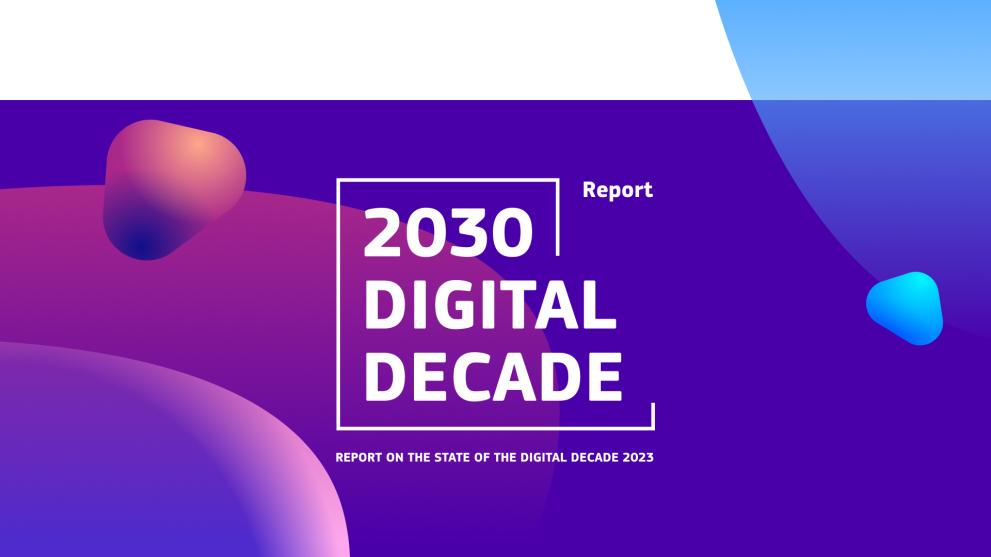2023 Report on the State of the Digital Decade

On 27 September 2023, the European Commission published the first report on the State of the Digital Decade (previously known as Digital Economy and Society Index, DESI). The new report is the first of a series of annual reports - and a call to Member States for collective actions to address the current investment gaps, accelerate digital transformation in Europe and intensify efforts to reach the objectives of the Digital Decade Policy Programme (DDPP).
The report's recommendations offer practical steps to advance digital transformation and will guide discussions and collaboration between the Commission and Member States. The report assesses the EU's progress in digital transformation and sets the stage for coordinated efforts to achieve common digital goals.
The key findings in the various areas covered in the report are as follows:
Digital Infrastructure
The 2030 target is to ensure full gigabit coverage across the EU as well as 5G coverage in all populated areas. At the moment, 55% of rural households are still not served by any advanced network and 9% are not yet covered by any fixed network at all. More investment is needed to ensure full gigabit coverage across the whole single market and 5G coverage of populated areas, thus reducing regional disparities and making sure no one gets left behind in the digital future.
Semiconductors
Semiconductors are essential to all digital technologies. The EU aims to double its share of the global semiconductor market value by 2030, from 10% to 20%. The European Chips Act aims to build a robust semiconductor ecosystem and resilient supply chains. Member States should promote national policies and invest further to boost domestic chip design, manufacturing, and advanced tech skills to make it happen.
Digital Business
Digitalising businesses is currently one of the most vital factors contributing to economic success and growth, especially in an unpredictable and rapidly changing environment. Without additional investment and incentives by 2030, only 66% of businesses will have adopted cloud technology, 34% will utilise big data, and a mere 20% will embrace artificial intelligence (AI). Meanwhile, the latest data shows that just 69% of EU SMEs have reached a basic level of digital proficiency, with progress varying significantly among Member States. To combat this, Member States are urged to boost awareness regarding the benefits of digitalization and provide support for European Digital Innovation Hubs (EDIHs). While there has been a significant increase in the number of EU-based unicorns over the past decade, this isn't a reason for complacency in volatile markets. The EU had 249 unicorns at the beginning of 2023, but this pales in comparison to the 1,444 in the United States and 330 in China. Although the trend is positive, disparities with other advanced economies persist, emphasizing the need for continued efforts to close the gap and remain competitive on the global stage.
Digitalisation of public services
The Digital Decade and Public Digitalization Plan (DDPP) sets ambitious goals, aiming for 100% online accessibility of vital public services, online interaction possibilities with public administrations, access to electronic health records for all Union citizens, and secure electronic identification (eID) for all Union citizens. While many Member States are well-prepared to achieve these objectives, significant investments are required to enhance the cross-border availability and efficiency of public services. Additionally, the deployment of the European Digital Identity Wallet is underway and expected to be fully operational by 2030, complemented by the proposed Digital Euro introduced in June 2023.
Digital Skills
The EU has set forth ambitious digital goals, aiming to improve the digital skills of at least 80% of individuals aged 16-74 and to have 20 million ICT specialists by 2030. However, the report reveals that without significant changes, only 59% of the population will be able to possess basic digital skills by 2030, and the number of ICT specialists might not exceed 12 million. To bridge this gap, Member States must prioritise investments in top-notch education and skill development while also encouraging women to engage in STEM disciplines (science, technology, engineering, and mathematics) from a young age. More in general, building on the European Year of Skills, Member States should prioritise investment in digital education and skills and adapt to the rapidly evolving digital landscape.
Values and principles for the online society
Digital technologies and services hold the power to influence our collective way of life and how we engage as citizens. The European Union set the global standard in creating a digital environment that is centred on people, rooted in fundamental rights, inclusive, transparent, and open. The report points out that the EU is taking the lead in making sure that the digital world is safe, secure, and centred around people, pertinent policies and legal initiatives have been implemented to ensure a safe digital future, including the Digital Services Act, the AI Act, the European Media Freedom Act, and the Communication on Virtual Worlds.
A sustainable digital transition
The EU has been actively working to maximise synergies of green transition and digital transformation. The report tracks the continuous work to make the shift to digital technology more environmentally friendly. Actions like the Right to Repair initiative, guidelines for making mobile phones and tablets eco-friendly, and the EU's plan to make energy systems digital will all help decrease the environmental impact of digital tech. It's also important to invest more through National Recovery and Resilience Plans or shared investments to fully move toward digital solutions that don't harm the environment. Additionally, the EU needs better way to keep track of how much electronic communication services affect the environment.
International partnerships
The 2030 Digital Decade plan highlights how working together with like-minded countries worldwide is crucial to upholding the EU's values. To achieve this, the EU has made headway by forming digital partnerships with Japan, the Republic of Korea, and Singapore. They've also established Trade and Technology Councils with the United States and India. Furthermore, the EU has taken proactive steps to assist Ukraine in its digital transformation journey, including integrating Ukraine into the EU's free-roaming area.
Conclusion
"The first report serves as a useful guide on what has to be done to bridge the gap and ensure that the full digital transition is reached by 2030" says Věra Jourová, Vice-President for Values and Transparency. The success of the Digital Decade will be critical for the EU’s future prosperity. Achieving success in the EU's digital transformation requires a significant acceleration and deeper commitment from both the EU and its Member States. The Commission will start discussing with Member States, the European Parliament, and stakeholders on how to progress together using the Digital Decade governance mechanism. Simultaneously, it will collaborate with stakeholders and partners beyond the EU's borders.
"The message from our first Digital Decade report is clear: we need to accelerate our efforts to reach our targets by 2030. Now is the moment to work together to put Europe at the forefront of the digital transition. This is the meaning of the recommendations that we issue today to Member States". Thierry Breton, Commissioner for Internal Market.
© European Commission




